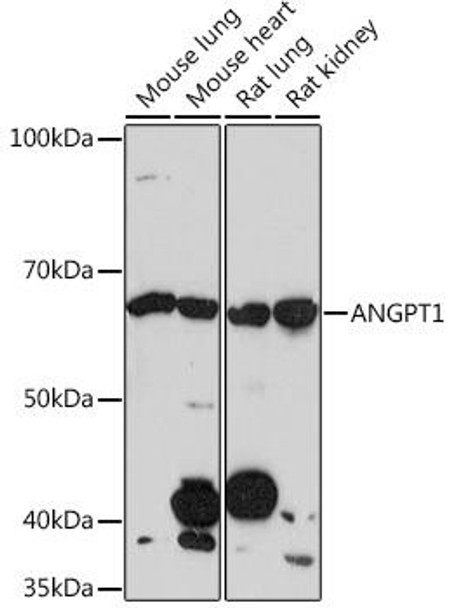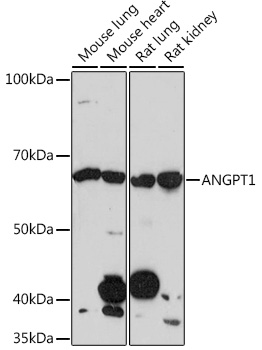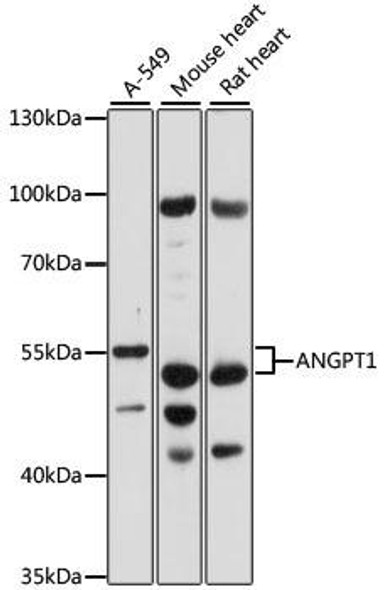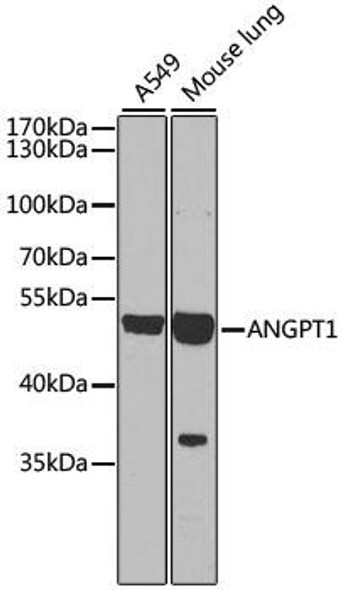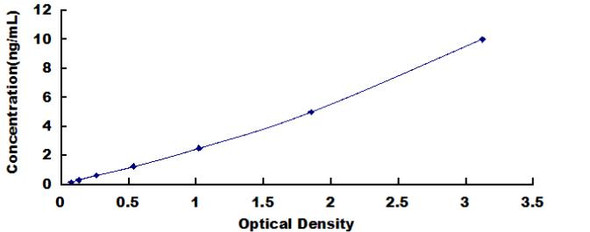Cardiovascular Antibodies
Anti-ANGPT1 Antibody (CAB3757)
- SKU:
- CAB3757
- Product Type:
- Antibody
- Reactivity:
- Human
- Reactivity:
- Mouse
- Reactivity:
- Rat
- Host Species:
- Rabbit
- Isotype:
- IgG
- Research Area:
- Cardiovascular
Description
| Antibody Name: | Anti-ANGPT1 Antibody |
| Antibody SKU: | CAB3757 |
| Antibody Size: | 20uL, 50uL, 100uL |
| Application: | WB IHC |
| Reactivity: | Human, Mouse, Rat |
| Host Species: | Rabbit |
| Immunogen: | A synthesized peptide derived from human ANGPT1 |
| Application: | WB IHC |
| Recommended Dilution: | WB 1:500 - 1:2000 IHC 1:50 - 1:200 |
| Reactivity: | Human, Mouse, Rat |
| Positive Samples: | Mouse lung, Mouse heart, Rat lung, Rat kidney |
| Immunogen: | A synthesized peptide derived from human ANGPT1 |
| Purification Method: | Affinity purification |
| Storage Buffer: | Store at -20'C. Avoid freeze / thaw cycles. Buffer: PBS with 0.02% sodium azide, 0.05% BSA, 50% glycerol, pH7.3. |
| Isotype: | IgG |
| Sequence: | Email for sequence |
| Gene ID: | 284 |
| Uniprot: | Q15389 |
| Cellular Location: | Secreted |
| Calculated MW: | 57kDa |
| Observed MW: | 58KDa |
| Synonyms: | AGP1, AGPT, ANG1 |
| Background: | This gene encodes a secreted glycoprotein that belongs to the angiopoietin family. Members of this family play important roles in vascular development and angiogenesis. All angiopoietins bind with similar affinity to an endothelial cell-specific tyrosine-protein kinase receptor. The protein encoded by this gene is a secreted glycoprotein that activates the receptor by inducing its tyrosine phosphorylation. It plays a critical role in mediating reciprocal interactions between the endothelium and surrounding matrix and mesenchyme and inhibits endothelial permeability. The protein also contributes to blood vessel maturation and stability, and may be involved in early development of the heart. Alternative splicing results in multiple transcript variants encoding distinct isoforms. [provided by RefSeq, Sep 2015] |
| UniProt Protein Function: | ANGPT1: Binds and activates TEK/TIE2 receptor by inducing its dimerization and tyrosine phosphorylation. Plays an important role in the regulation of angiogenesis, endothelial cell survival, proliferation, migration, adhesion and cell spreading, reorganization of the actin cytoskeleton, but also maintenance of vascular quiescence. Required for normal angiogenesis and heart development during embryogenesis. After birth, activates or inhibits angiogenesis, depending on the context. Inhibits angiogenesis and promotes vascular stability in quiescent vessels, where endothelial cells have tight contacts. In quiescent vessels, ANGPT1 oligomers recruit TEK to cell-cell contacts, forming complexes with TEK molecules from adjoining cells, and this leads to preferential activation of phosphatidylinositol 3-kinase and the AKT1 signaling cascades. In migrating endothelial cells that lack cell-cell adhesions, ANGT1 recruits TEK to contacts with the extracellular matrix, leading to the formation of focal adhesion complexes, activation of PTK2/FAK and of the downstream kinases MAPK1/ERK2 and MAPK3/ERK1, and ultimately to the stimulation of sprouting angiogenesis. Mediates blood vessel maturation/stability. Implicated in endothelial developmental processes later and distinct from that of VEGF. Appears to play a crucial role in mediating reciprocal interactions between the endothelium and surrounding matrix and mesenchyme. |
| UniProt Protein Details: | Protein type:Secreted; Secreted, signal peptide Chromosomal Location of Human Ortholog: 8q23.1 Cellular Component: extracellular space; microvillus; plasma membrane; extracellular region; lipid raft Molecular Function:receptor tyrosine kinase binding Biological Process: transmembrane receptor protein tyrosine kinase activation (dimerization); positive regulation of cell adhesion; positive regulation of receptor internalization; negative regulation of protein import into nucleus; negative regulation of cell adhesion; positive chemotaxis; negative regulation of protein amino acid phosphorylation; hemopoiesis; negative regulation of neuron apoptosis; regulation of I-kappaB kinase/NF-kappaB cascade; cell differentiation; Tie receptor signaling pathway; regulation of endothelial cell proliferation; in utero embryonic development; positive regulation of blood vessel endothelial cell migration; positive regulation of peptidyl-serine phosphorylation; cell-substrate adhesion; negative regulation of cytokine secretion during immune response; positive regulation of phosphoinositide 3-kinase cascade; positive regulation of protein kinase B signaling cascade; positive regulation of peptidyl-tyrosine phosphorylation; heparin biosynthetic process; positive regulation of protein ubiquitination; regulation of protein binding; negative regulation of vascular permeability; regulation of tumor necrosis factor production; regulation of satellite cell proliferation; sprouting angiogenesis; blood coagulation; leukocyte migration; negative regulation of apoptosis |
| NCBI Summary: | Angiopoietins are proteins with important roles in vascular development and angiogenesis. All angiopoietins bind with similar affinity to an endothelial cell-specific tyrosine-protein kinase receptor. The protein encoded by this gene is a secreted glycoprotein that activates the receptor by inducing its tyrosine phosphorylation. It plays a critical role in mediating reciprocal interactions between the endothelium and surrounding matrix and mesenchyme and inhibits endothelial permeability. The protein also contributes to blood vessel maturation and stability, and may be involved in early development of the heart. Alternative splicing results in multiple transcript variants encoding distinct isoforms.[provided by RefSeq, Dec 2010] |
| UniProt Code: | Q15389 |
| NCBI GenInfo Identifier: | 12229574 |
| NCBI Gene ID: | 284 |
| NCBI Accession: | Q15389.2 |
| UniProt Secondary Accession: | Q15389,Q5HYA0, |
| UniProt Related Accession: | Q15389 |
| Molecular Weight: | 57,456 Da |
| NCBI Full Name: | Angiopoietin-1 |
| NCBI Synonym Full Names: | angiopoietin 1 |
| NCBI Official Symbol: | ANGPT1 |
| NCBI Official Synonym Symbols: | AGP1; AGPT; ANG1 |
| NCBI Protein Information: | angiopoietin-1; ANG-1 |
| UniProt Protein Name: | Angiopoietin-1 |
| UniProt Gene Name: | ANGPT1 |
| UniProt Entry Name: | ANGP1_HUMAN |

